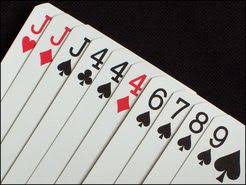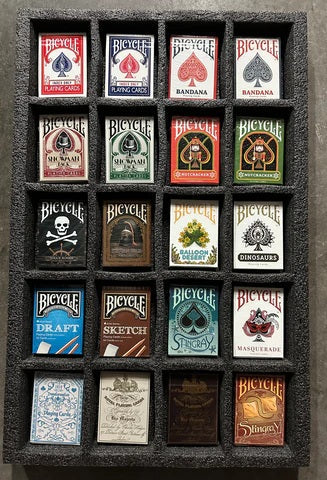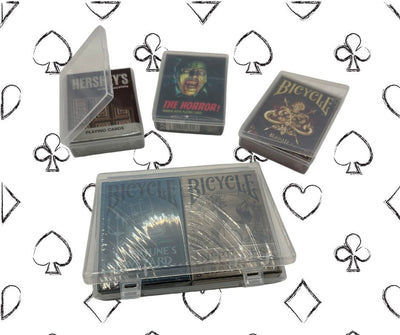(A Gin Hand with 3 melds)
Card Game Rules
Gin Rummy, often simply called 'Gin', is a classic card game for two players played with a standard 52-card deck. In this matching game, cards hold their face values, with Aces assigned a value of 1 and all face cards valued at 10. The primary goal is to be the first player to score 100 points. In this guide, we'll delve into the rules and strategies to master Gin Rummy.
For more Rummy type games, check out our guides for Basic Rummy and Canasta.
If you are looking for cards to play Rummy with, check out a standard pack here or one of our more recent arrivals here.
Set Up
Before game play can begin, a dealer must be selected. Each player draws one card from a shuffled deck. The player with the lowest card becomes the dealer
The dealer shuffles the deck and passes out 10 cards alternately to each player. The remaining cards are placed faced down in the center of the group to form the stock. The top card of the stock is flipped face up and placed next to the stock to form the discard pile.
How to Play
The player opposite of the dealer has the option to play first by taking the top card of the discard pile. If they choose to pass, the dealer has the choice to take the top card of the discard pile. If they also choose to pass, the other player begins the game by taking the top card from the stock pile. From the first draw onward, a player must pick up a card from either the stock or the discard pile at the beginning of their turn and remove one card from their hand to the discard pile at the end of their turn.
The general goal is to get rid of “deadwood” by melding as many cards as you can in order to go Knock or go Gin. Deadwood are cards not in a meld. If no player can reach Knock or Gin by the time the stock pile has two cards left, no points are awarded.
Melding
A player makes a meld by either having three or more of a kind or by having three or more of a run. A run is made of three or more cards of the same suit in increasing or decreasing order. Unlike Basic Rummy, players do not lay down their melds in Gin Rummy until someone goes Knock.
Knocking
A player can go Knock when the card value of their deadwood is 10 or less. To go Knock, the player places the card they will discard face down on the discard pile. After a player goes Knock, all cards are faced up and the non-knocking player has the opportunity to lay off their deadwood cards onto the knocking players’ melds. For instance, if a player has made a meld of 3 Kings and the player in play has the fourth King, they may place it on the 3 King meld to complete the set. Likewise, if a meld is made of the 2, 3, and 4 of clubs and the player in play has the Ace of clubs, they may place it before the 2 to build upon the run.
After the non-knocking player makes the most lay offs they can, points are given to the knocking player based on the difference between the card values of the remaining deadwood in the game. If the non-Knocking player has less deadwood than the knocking player, it is known as an undercut and the non-knocking player receives the points along with a 10 point bonus.
Going Gin
A player goes Gin if they get rid of all of their deadwood through melds. Going Gin results in a 25 point bonus along with the deadwood value of the other player.
Gameplay Example
Suppose the deck has been dealt. You have the following hand: the Ace, 4, 6, 7, Jack and King of Spades, the Ace of Diamonds, and the 5, 9, and Queen of Clubs. The card in the discard pile is the Queen of Spades. On your turn, you selected the Queen from the discard pile and remove your initial Queen of clubs to form a run of Spades (J, Q, and K). The other player takes their turn. You draw from the stock and receive a 2 of Diamonds and remove the 9 of clubs. On your next turn you draw an 8 of Spades and remove the 5 of Clubs. Your hand is now 2 melds (a run the J, Q, and King of Spades and a run of the 6, 7, and 8 of Spades) and four deadwood cards (an Ace and 4 of Spades and an Ace and 2 of Diamonds). The other player Knocks with the 9 of Hearts. Because your deadwood cards are valued at 8, you undercut their Knock and win the round. The 10 point undercut bonus plus the difference of deadwood cards (9 minus 8) gives you a total of 11 points for the round.
A free online version of Gin Rummy may be found here.
History
(An old cartoon mocking the complexity and simplicity of Gin Rummy)
Gin Rummy, as all Rummy-styled games, traces its origins to either the Chinese game of Khanhoo or the Mexican game of Conquian. Rummy did not become Gin, however, until 1909 when Elwood T. Baker invented the offshoot with his son in Brooklyn, New York. As the book Culbertson's Card Games Complete describes it “The principal fad game, in the years 1941-46, of the United States, Gin Rummy (then called simply Gin) was devised in 1909 by Elwood T. Baker of Brooklyn, N. Y., a whist teacher; the name, suggested by Mr. Baker's son, played on the alcoholic affinity of rum and gin; the game was resurgent 1927-30, then dormant until 1940, then adopted by the motion-picture colony and the radio world, who gave it the publicity essential to a fad game.”
For more information of the History of Gin Rummy, check out David Parlett's comprehensive article here.
For even more information on Gin Rummy, check out pagat's article here.
Variations
Like Basic Rummy, Gin has many variations. While this guide offers to illustrate a few of them, you can out check a fuller list on this Wikipedia page here.
Oklahoma Gin
In Oklahoma Gin, the first discarded card determines the maximum value of deadwood cards a player can have in order to call Knock, whereas in a traditional game of Gin Rummy a player can go Knock at 10 or less. Additionally, if the first card in the discard pile is a Spade, the end tally is doubled for the winner.
Tedesco Gin
Tedesco Gin is a much more complicated version of Basic Gin Rummy. It is played in 3 rounds to 200 points. Aces can be either high or low depending of need. Runs may be continuous (e.g. K, A, 2). Additionally, a deadwood Ace counts as 15 points.
Continental Rummy
In Continental Rummy, players must wait until they can play their entire hand and they are able to play in any of the following sequences.
Additionally, when a player goes out they receive the following:
Looking for more card games to play? Check out this article:
40+ Great Card Games For All Occasions
About the author: John Taylor is a content writer and freelancer through the company Upwork.com. You may view his freelancing profile here. He has a B. A. in English, with a specialty in technical writing, from Texas A&M University and a M. A. in English from the University of Glasgow. You may view his previous articles about card games here and his LinkedIn profile here.








18 comments
Been playing a combined game that I call ‘Hot Gin’. Hot is an acronym for Hollywood-Oklahoma-Tedesco. You use Hollywood scoring, Oklahoma to set the Knock (and have the occasional spade double-point round), and Tedesco to have Ace high/low/wrap and worth 15. (credit where due).
Awesome content! Thank you for sharing this wealth of information. It was very interesting and very useful content. I’m definitely pinning it to share!
In a 2 person game, the first player picks up the flipped card to start the game, but then flops with the deadwood point value of the card picked up. Does the other player get a turn to draw or do they only get to play on the flopped cards and the game ends?
Can a player pick up more than the top card in the stock pile?
The only thing still not clear is whether you discard when you go gin. Do you have to discard?